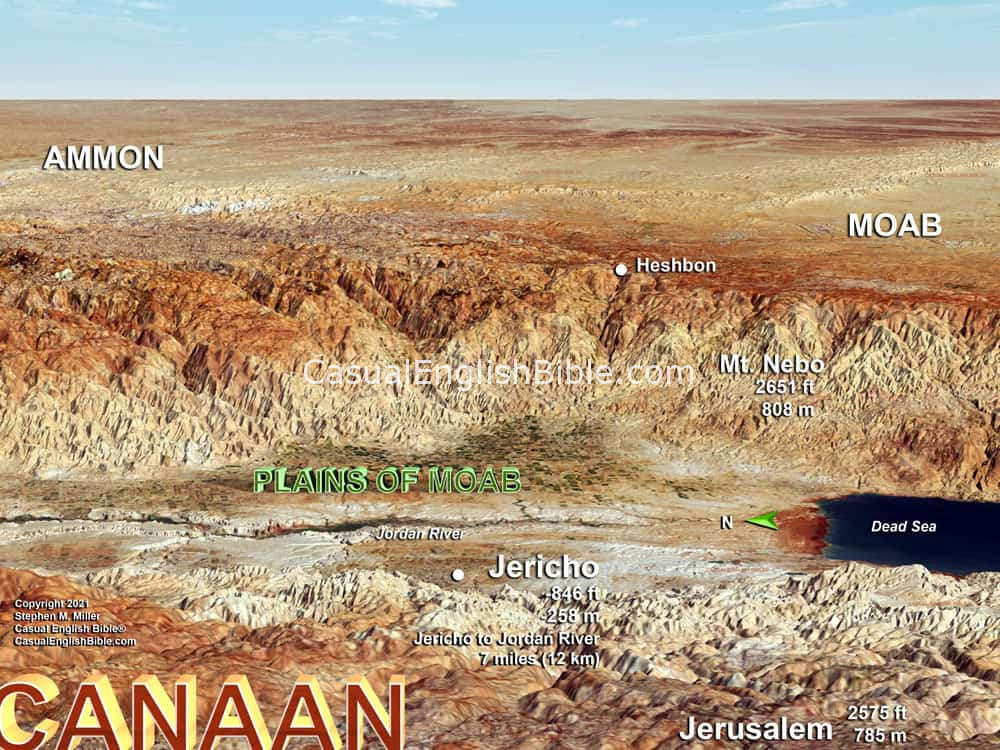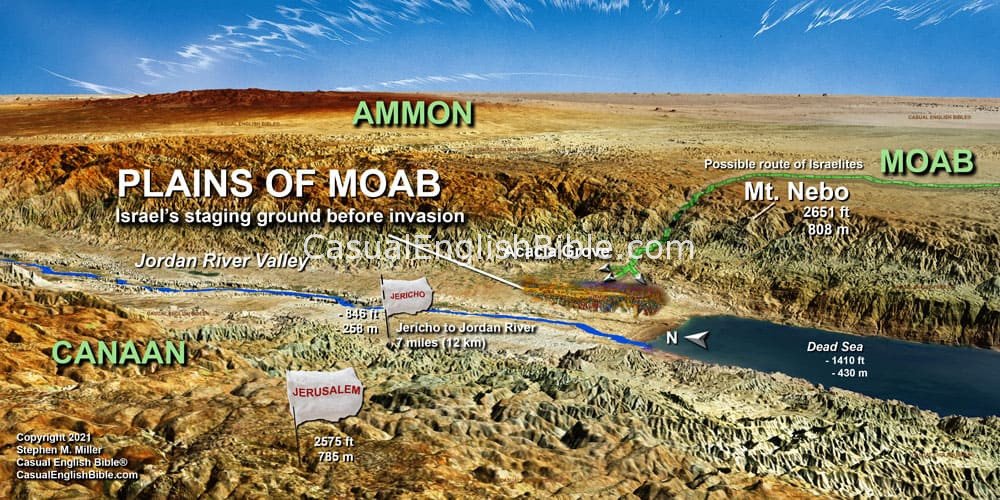Deuteronomy 3
Israel conquers Og, giant of a king
Israel annexes 60 towns
1We took the trail up toward Bashan. King Og of Bashan and his army, ready for battle, came to stop us at Edrei. 2The LORD told me, “Don’t be afraid of this man. I’ve already given him to you, along with all of his people and all of his land. All you need to do is what you did to the Amorite King Sihon of Heshbon. Take him.” 3So, the LORD our God gave us King Og of Bashan and his people. We killed them all. We took no prisoners and left no survivors. 4We captured all 60 of his towns, along with the territory of Argob—all of Og’s kingdom of Bashan. 5Towering walls, with gates and metal bars protected all of these cities. We also captured towns that didn’t have walls. 6We annihilated all the people we found, just as we did with the people of King Sihon at Heshbon. We killed men, women, and children everywhere we found them. 7We kept the animals, though. And we kept anything we wanted that the dead left behind.Israel annexes two kingdoms
8So, we now owned two Amorite kingdoms. We controlled all their land east of the Jordan River, from the Arnon canyon in the south to Mount Hermon in the north.9
(People of Sidon called Mount Hermon “Mount Sirion.” Amorites called it “Mount Senir.”) [1]
10We owned all the cities of the Golan Heights. [2] And we owned all of Gilead and all of Bashan as far as Salecah [3] and Edrei, [4] two cities of King Og of Bashan.11
(King Og was the last of the legendary Rephaites. [5] He had an iron bed more than 13 feet long and six feet wide. [6] It’s now in Rabbah, capital of Ammon.)
Dividing land east of Jordan
12After we captured the land east of the Jordan River, I divided it among the Israelite tribes that wanted to settle there. I gave the tribes of Reuben and Gad the land from the Arnon canyon near the city of Aroer, in the south, to the hills of Gilead in the north. 13I gave the rest of Gilead and all of Bashan to half the tribe of Manasseh. They got the entire territory of Argob.(In Bashan, it’s known as the land of the Rephaites.
Israel’s strike force
18Then I told the tribes settling east of the river, “The LORD your God has given you this land we’re looking at now. It’s yours for the taking. Your brave soldiers will arm themselves as an elite strike force, and go in first, ahead of soldiers from the other tribes. [9] 19But your wives and children may stay behind, with your vast herds and flocks of livestock. They can stay in the safety of the cities I’ve given you. 20And they can stay there until you and the other warriors are finished fighting. After you’ve taken the land that the LORD your God is giving you on the other side of the Jordan River, you can return home to your families and reclaim everything that belongs to you.”Joshua’s mission
21I also had something to say to Joshua. “You saw everything the LORD your God did to these kings we just defeated. He’s going to do it again. Over and over. He’s going to crush every kingdom you’re about to face when you cross the Jordan River. 22Don’t be afraid of these people. The LORD your God himself is fighting for you.”God rejects request of Moses
23I talked with the LORD, too. I said, 24“God and master, you have shown me that you’re strong. We could look high and low for a god as strong as you. But there aren’t any. 25Please show me your kindness now and let me cross the Jordan. Let me at least see this wonderful land with its beautiful hills and the mountains of Lebanon.”26The LORD refused. He was still angry with me because of what you people did. [10] He told me off. He said, “That’s it! I don’t want to ever hear you ask me that again! 27I will let you see the land, though. Go to the top of the Pisgah mountains and look across the Jordan River Valley. You can’t go there. But you’ll be able to see the land spread out in front of you—to the west, the north, and the south. 28But Joshua is the one who will lead the people across the river. Give him that mission and then encourage him. The land you see in front of you is the land Joshua will give the people. It’s their inheritance.” [11] 29We camped in a valley near Beth-Peor. [12]
Footnotes
This note, apparently inserted after the time of Moses, refers to a pair of other names for Mount Hermon, both of which show up in ancient documents. “People of Sidon” were Phoenicians who lived in what is now Lebanon. Their name for the mountain appears in clay Ugaritic tablets written in cuneiform in about 1200 BC, around the time some say Israel started conquering the Promised Land. The tablets were found in neighboring Syria. The Amorite name was found in Assyrian records written in the 700s BC.
“Golan Heights” is the current name. The ancient Hebrew text simply describes the land as a “plateau” or “level ground.”
Salecah is usually linked to the city of Salkhad, about 60 miles (100 km) east of the southern tip of the Sea of Galilee.
Edrei is linked to Der’a, a city about 60 miles (100 km) south of Damascus and 30 miles (50 km) east of the Jordan River.
Rephaites, whoever they were, remain a mystery. They have been described as an ancient race of giants. Some speculate they were the original people who lived in the region of Bashan, now called the Golan Heights.
Over 4 meters long and almost two meters wide.
Jair is one of the Israelite heroes often called “judges” (Judges 10:3).
Pisgah means “summit.” Mount Pisgah may refer to one or more of the high points on Moab’s plateau overlooking the Dead Sea, the Jordan River, and Canaan below, to the west. Mount Nebo is there, where Moses died. It’s the highest summit on the plateau, at 2,300 feet elevation, or 710 meters. That’s an especially good vantage point to view what is now Israel and Palestinian territories since the Dead Sea is about 1,400 feet below sea level, or 430 meters. With the Israelites camped near the Jordan River, Balak (Numbers 23:14) would have been more than a kilometer above them, about three-fourths of a mile.
Part of the agreement the tribes east of the Jordan made with Moses was that “when it comes time to fight, we’ll arm ourselves and lead the charge” (Numbers 32:17).
See 1:37. And see Numbers 20 for the story behind God’s anger. The scene involves Moses using his walking stick to tap a rock in the desert, to break open a stream of spring water. Scholars debate why God reacted so angrily. Two popular guesses: God told Moses to merely speak to the rock, but Moses hit it with a stick—twice. Also, Moses seemed to take some credit for the miracle when he said “Do we have to bring water from this rock” (verse 9). As in God and Moses, the tag team? Some scholars say God’s complaint about Moses and Aaron in Numbers 20: 12, 24 seems like an overreaction to what the men did. So, another guess is that the writer didn’t want to report what really happened. It was that serious. Instead, he wanted to protect the reputation of the men.
The Israelites were inheriting the land from their ancestors Abraham, Isaac, and Jacob. Those three fathers of Israel never formally owned the land, but God promised he would give it to their descendants (Genesis 12:7; 26:3; 28:13). Whether that promise remains in effect today is controversial. Some might argue that apostle Paul seems to have said Jesus erases borders: “I’ll tell you who Abraham’s children are. They’re the people with faith… Here’s what all of this means. We’re not Jews or non-Jews. We’re not slaves or free folk. We’re not men or women. We’re one people, united in Jesus, the Messiah. If you’re one of the Messiah’s people, then you’re a descendant of Abraham. You’re part of the family. And you’re going to inherit what God promised” (Galatians 3:7; 38-39).
Beth-Peor was a city near Mount Nebo in the Pisgah mountains. The valley Moses mentioned may have been what is described elsewhere as the “plains of Moab,” on the east side of the Jordan River, across from Jericho.
Discussion Questions
- Sorry, there are currently no questions for this chapter.








